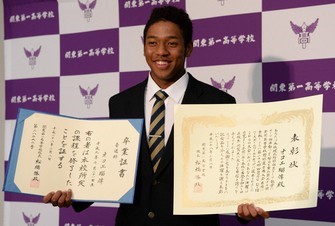Baseballer Louis Okoye lauded for tweets on prejudice against multiracial Japanese people

TOKYO - June 17, 2020 (Mainichi Japan)- "I thought if I jumped (from my balcony) and was born again, maybe I could be a normal Japanese person," wrote Louis Okoye, 22, a pro baseball player with the Tohoku Rakuten Golden Eagles, in an essay he posted to Twitter describing his experiences of growing up in Japan with discrimination and insensitivity from those around him. His decision to speak out received a huge showing of support, and Okoye wrote, "I hope this helps to encourage others in the same situation."
Born in 1997 in Tokyo to a Nigerian father and a Japanese mother, Okoye started playing baseball from a young age. At the 2015 summer National High School Baseball Championship in Koshien Stadium, in the western Japan city of Nishinomiya, Hyogo Prefecture, he excelled as an outfielder for the Kanto Daiichi High School team and was instrumental in bringing the team to the top four. In 2016 he was a first draft pick for the Rakuten Eagles, and turned professional.
A screenshot of the tweet by Louis Okoye that describes his experiences growing up in Japan is seen in this image. (Mainichi)
The tweet that invited such a huge response was posted to his account at 11:26 p.m. on June 15. He started by saying, "I'm not trying to blame anyone. And I'm not complaining, either." He went on, "When I think about how this could help someone in the same situation, or their parents, even by just a little, I feel I can post this accepting I might get flamed. What I'm laying out is my own really distressing past."
Okoye started with a story from when he was about 5 and attending day care. One day, while the class listened to a reading of "The Ugly Duckling," the kids around Okoye kept staring at him. Another time, during a class when the children were told to draw their parents' faces, the teacher announced they needed to color in the drawings with "skin color" crayon, and he cried while using the brown crayon to fill in his father's likeness.
It was a difficult time in Okoye's life. Looking back on it, he said, "I would look out from the balcony of our home, and think, if I jumped off and was born again, maybe I could come back as a normal Japanese person." He added, "Even now, I still wonder what that normalness might be."
Okoye also shed light on his initial experiences with baseball. Writing about his time as a very young player, he said, "The boys above me would mock the color of my skin, and say things like I eat insects at home, and they would verbally abuse me and hit me, and say things I can't even write here."
When he would line up with his teammates ahead of a game, players on the other team would say things like, "They've got a foreigner. He's black." Even when he was playing in high school, he said he heard people say things like, "You can't use a foreigner for high school baseball," and, "Black people shouldn't get to go to Koshien."
Even when Okoye did get to play at Koshien, sports publications wrote about him in loaded terms. Among the reporting, some of which was criticized, one described his play style in discriminatory language as "all-out wildness," while another wrote, "The midsummer Koshien had been transformed into a savannah."
Writing on Twitter, Okoye said his feelings "disappeared" in response to the hurtful words and actions around him. "The instant my feelings disappeared, I felt like I was invincible. But now when I think about it, I see that all I did was shut my feelings down, and felt nothing toward others," he wrote.
By 9 p.m. on June 16, his tweets had amassed around 40,000 retweets, and some 146,000 likes. Among the responses he received were ones reading, "I used to not take this sort of thing seriously, and thought, 'Japan doesn't have the same level of skin-color based discrimination that the U.S. has,' and for that I'm sorry." Another wrote, "I'm also a biracial black-Japanese person. When I was in kindergarten, I would use the same skin-colored crayons, even though I would think that the color of my skin was totally different to my peers.' "
Julian Keane, a researcher on the culture of people with diverse roots at Osaka City University's Urban-Culture Research Center, said of the tweets, "They give a striking impression that he chose his words very carefully. While avoiding using the word discrimination, he sent a message to people in the same situation that let them know, 'You're not alone,' and seemed to highlight that this oppressive reality continues in Japanese society today."
Keane continued, "In Japan, there is an excessive demand for people to be 'normal Japanese people.' People with foreign heritage are in their daily lives exposed to two layers of judgment, one which is an exclusionary viewpoint that they aren't Japanese enough, the other that people around them are looking for proof they are like other Japanese people."



